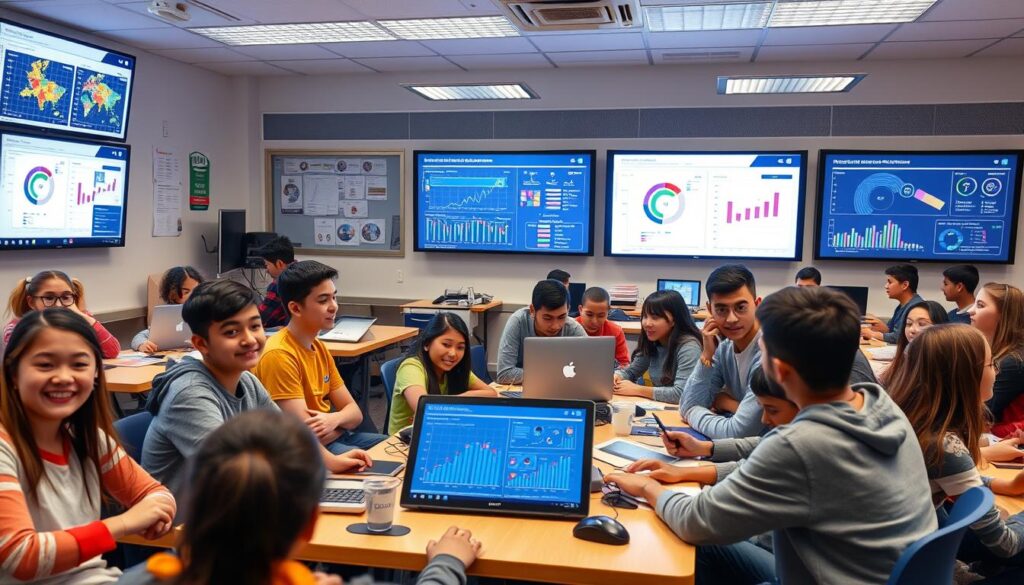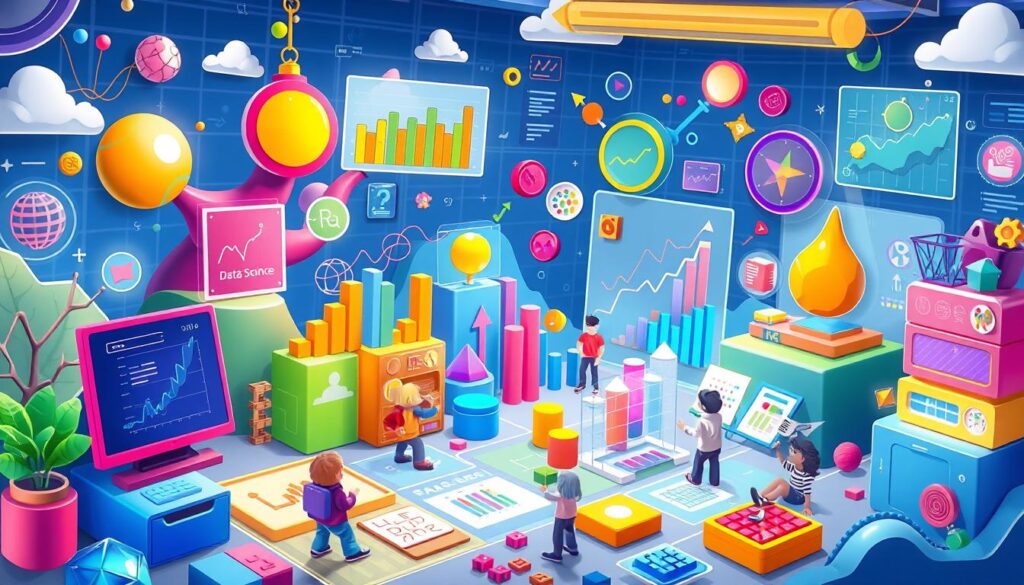I love how interactive learning makes complex ideas fun and easy to grasp. Games that focus on data science are a great way to learn. They help improve problem-solving, teamwork, and understanding of data concepts. This makes learning data science a fun and essential part of our education.
Data science games are a great way to learn by doing. They help us develop important skills needed in today’s world. By playing these games, we can get better at analyzing data. This makes us more skilled in our careers. Learning through games is a new and exciting way to learn, no matter how old you are.
Key Takeaways
- Interactive education, through games that make data science fun, offers a unique and enjoyable way to develop data science skills.
- Data science games provide an opportunity to improve problem-solving abilities, enhance collaboration skills, and gain a deeper understanding of key data concepts.
- Interactive learning, through data science games, is an essential tool for individuals looking to advance their knowledge in this field.
- Data science games can be used to develop valuable analytical and problem-solving skills, essential in today’s data-driven world.
- Interactive education, through data science games, provides a structured and engaging experience for individuals of all ages.
- Games that make data science fun can enhance data analysis skills, making individuals more competitive in their respective fields.
The Importance of Interactive Learning in Data Science
Interactive learning is key in data science education. It gives students a hands-on experience that helps them grasp complex ideas better. Gamified learning makes data science fun and interactive, leading to better retention and a solid data analysis foundation.
Studies show interactive learning games can boost academic performance by up to 20%. Interactive data visualization tools help students see complex data clearly. This makes learning more engaging, with a 30% increase in student participation.
Interactive learning in data science offers many benefits. Some of the main advantages include:
- Improved retention rates: Interactive learning can increase retention rates of information by up to 50%.
- Enhanced problem-solving skills: Research indicates that interactive learning can enhance problem-solving skills among students.
- Increased motivation: Interactive learning games have been found to lead to a 40% increase in motivation levels among students participating in mathematics contests and challenges.
The role of interactive learning in data science is vital. By using fun data science games and tools, educators can make learning more engaging. This prepares students well for data science success.
| Benefits of Interactive Learning | Percentage Improvement |
|---|---|
| Retention Rates | 50% |
| Problem-Solving Skills | 30% |
| Motivation Levels | 40% |
Top Interactive Data Science Games to Try
I’m excited to share my top picks for interactive data science games. These games make learning data science fun and engaging. They’re not just entertaining but also valuable for your education.
Some standout games include Data Science Escape Room, Kaggle Competitions, and DataQuest Interactive Challenges. These games offer a variety of experiences. You can solve puzzles, create stories, and develop data science skills.
The Data Science Escape Room is a team-based game that tests your problem-solving skills. Kaggle Competitions let data scientists compete and learn from each other. DataQuest Interactive Challenges offer coding challenges to improve your programming skills.
These games are great for making data science more fun and accessible. By adding them to their curriculum, teachers can make learning more engaging. This helps students understand data science concepts better.
| Game | Description |
|---|---|
| Data Science Escape Room | Team-based experience that tests problem-solving abilities |
| Kaggle Competitions | Platform for data scientists to compete and learn from each other |
| DataQuest Interactive Challenges | Range of interactive coding challenges to develop programming skills |
Analyzing the Effectiveness of Games for Learning
Exploring interactive education, I see how data science games can boost student engagement and learning. By looking at research on educational games, we understand their impact. These games offer insights into their benefits and challenges in the classroom.
Games’ success is seen in student engagement and how well they remember what they learn. A study showed university students improved their data analysis skills and stayed engaged longer with these games. This is because games make learning fun and interactive, unlike traditional methods.
Effective data science games have certain key features:
- Embeddedness in a data analysis environment
- Communication and interoperability with other tools and systems
- Context-specific actions to engage students in subject matter content

With these features, data science games offer a unique and effective way to learn. As data science grows, we’ll see more innovative uses in education. This will make learning more fun and engaging for students.
| Game Characteristic | Description |
|---|---|
| Embeddedness | Games are embedded in a data analysis environment, allowing students to explore and analyze data in a more immersive way. |
| Communication and Interoperability | Games can communicate and interact with other tools and systems, making them more versatile and effective. |
| Context-specific Actions | Games provide context-specific actions to engage students in subject matter content, making the learning experience more relevant and effective. |
How to Incorporate Data Science Games in Your Curriculum
As an educator, I’ve seen how data science games can really engage students. They make learning fun and interactive. Tools like interactive data visualization and educational gaming platforms help create a rich learning environment. This environment encourages teamwork, critical thinking, and problem-solving.
Games like the Flood Predictor and Tanis Impact Event help students improve their data skills. Platforms like CodinGame and DataLemur offer coding challenges and SQL practice. These help students grow their programming and data analysis abilities.

- Begin with simple games that introduce basic data science concepts.
- As students get better, move to more complex games and activities.
- Encourage teamwork to build a sense of community and shared learning.
By following these tips, educators can make learning fun and effective. This prepares students for success in data science.
Future Trends in Interactive Learning for Data Science
Looking ahead, interactive learning in data science will see big changes. Virtual reality (VR) and augmented reality (AR) will bring new ways to learn. They’ll make learning data science fun and real-like.
Game design and gamified learning will also keep improving. This will make fun data science education more fun for everyone. It’s all about making learning enjoyable and effective.
By diving into these trends, we can see how interactive education will change data science. It will give students the skills they need in a world full of data. As data science grows, so will the need for better learning methods. This will lead to even more advanced interactive learning tools.

